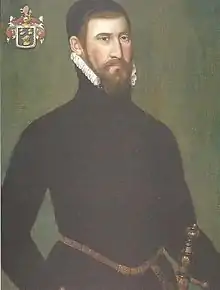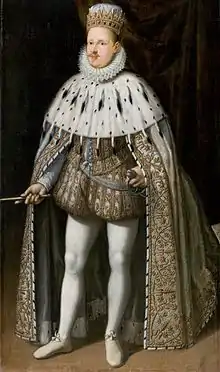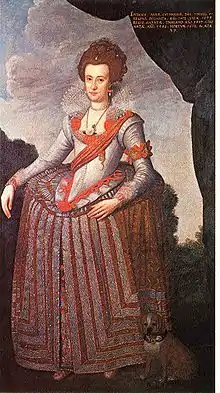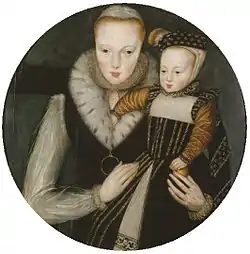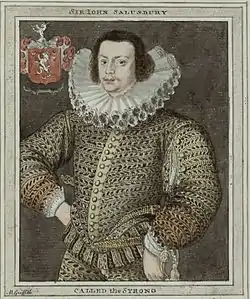1612
1612 (MDCXII) was a leap year starting on Sunday of the Gregorian calendar and a leap year starting on Wednesday of the Julian calendar, the 1612th year of the Common Era (CE) and Anno Domini (AD) designations, the 612th year of the 2nd millennium, the 12th year of the 17th century, and the 3rd year of the 1610s decade. As of the start of 1612, the Gregorian calendar was 10 days ahead of the Julian calendar, which remained in localized use until 1923.
| Millennium: | 2nd millennium |
|---|---|
| Centuries: | |
| Decades: | |
| Years: |
| 1612 by topic |
|---|
| Arts and science |
| Leaders |
| Birth and death categories |
| Births – Deaths |
| Establishments and disestablishments categories |
| Establishments – Disestablishments |
| Works category |
|
| Gregorian calendar | 1612 MDCXII |
| Ab urbe condita | 2365 |
| Armenian calendar | 1061 ԹՎ ՌԿԱ |
| Assyrian calendar | 6362 |
| Balinese saka calendar | 1533–1534 |
| Bengali calendar | 1019 |
| Berber calendar | 2562 |
| English Regnal year | 9 Ja. 1 – 10 Ja. 1 |
| Buddhist calendar | 2156 |
| Burmese calendar | 974 |
| Byzantine calendar | 7120–7121 |
| Chinese calendar | 辛亥年 (Metal Pig) 4308 or 4248 — to — 壬子年 (Water Rat) 4309 or 4249 |
| Coptic calendar | 1328–1329 |
| Discordian calendar | 2778 |
| Ethiopian calendar | 1604–1605 |
| Hebrew calendar | 5372–5373 |
| Hindu calendars | |
| - Vikram Samvat | 1668–1669 |
| - Shaka Samvat | 1533–1534 |
| - Kali Yuga | 4712–4713 |
| Holocene calendar | 11612 |
| Igbo calendar | 612–613 |
| Iranian calendar | 990–991 |
| Islamic calendar | 1020–1021 |
| Japanese calendar | Keichō 17 (慶長17年) |
| Javanese calendar | 1532–1533 |
| Julian calendar | Gregorian minus 10 days |
| Korean calendar | 3945 |
| Minguo calendar | 300 before ROC 民前300年 |
| Nanakshahi calendar | 144 |
| Thai solar calendar | 2154–2155 |
| Tibetan calendar | 阴金猪年 (female Iron-Pig) 1738 or 1357 or 585 — to — 阳水鼠年 (male Water-Rat) 1739 or 1358 or 586 |
| Wikimedia Commons has media related to 1612. |
Events
January–June
- January 6 – Axel Oxenstierna becomes Lord High Chancellor of Sweden. He persuades the Riksdag of the Estates to grant the Swedish nobility the right and privilege to hold all higher offices of government.
- January 20 – Matthias becomes Holy Roman Emperor, upon the death of Rudolf II.[1]
- January 20–November 4 – An uprising in Moscow expels Polish troops.
- March 2 – False Dmitry III is recognised as tsar by the Cossacks.
- April 11 – Edward Wightman, a radical Anabaptist, is the last person to be executed for heresy in England, by burning at the stake in Lichfield.[1]
- May 10 – Shah Jahan marries Mumtaz Mahal.
- May 23–25 – A Sicilian–Neapolitan galley fleet defeats the Tunisians at La Goulette.
- June 13 – Matthias, Holy Roman Emperor, is formally elected.[1]
July–December
- July 22 – Four women and one man are hanged, following the Northamptonshire witch trials in Northampton, England.
- August 20 – Ten Pendle witches are hanged, having been found guilty of practising witchcraft in Lancashire, England.
- August 26 – Battle of Kringen: A Scottish mercenary force is destroyed in Norway.
- November 29 – Battle of Swally, in which the English fleet beat the Portuguese
- November 29 – The Treaty of Nasuh Pasha is signed, between the Ottoman Empire and the Safavid Empire.
- November 30 – Battle of Swally: Forces of the English East India Company and Portugal engage off the coast of India, resulting in an English victory.
- December 15 – Simon Marius is the first to observe the Andromeda Galaxy through a telescope.
- December 28 – Galileo Galilei becomes the first astronomer to observe the planet Neptune when in conjunction with Jupiter, yet he mistakenly catalogues it as a fixed star, because of its extremely slow motion along the ecliptic. Neptune is not truly discovered as a planet until 1846, about 234 years later when Johann Gottfried Galle first sights it in the Berlin Observatory.
Date unknown
- Jamestown: John Rolfe exports the first crop of improved tobacco (seeds from Trinidad).
- The Nagoya Castle is completed in Japan.
- The Okamoto Daihachi incident in Japan.
- Thomas Shelton's English translation of the first half of Don Quixote is published. It is the first translation of the Spanish novel into any language.
- St Georges, Bermuda is established by English settlers.
Births
January–March
- January 17 – Thomas Fairfax, English Civil War general (d. 1671)
- January 21 – Henry Casimir I of Nassau-Dietz, Stadtholder of Groningen, Friesland and Drenthe (d. 1640)
- January 22 – Daniel Zwicker, German physician (d. 1678)
- January 23 – George FitzGerald, 16th Earl of Kildare, Irish earl (d. 1660)
- February 1 – William West, English politician (d. 1670)
- February 2 – Thomas Wentworth, 5th Baron Wentworth, English baron and politician (d. 1665)
- February 4 – Arthur Spry, English politician (d. 1685)
- February 5 – Crown Prince Sohyeon, Korean crown prince (d. 1645)
- February 6 – Antoine Arnauld, French theologian (d. 1694)
- February 7 – Thomas Killigrew, English dramatist and theatre manager (d. 1683)
- February 9 – Pier Francesco Mola, Italian painter of the High Baroque (d. 1666)
- February 15 – Paul de Chomedey, Sieur de Maisonneuve, French military officer, founder of Montreal in New France (d. 1676)
- February 20 – Richard Olmsted, Connecticut settler (d. 1687)
- February 21 – Lorenzo Imperiali, Italian cardinal (d. 1673)
- February 22 (bapt.) – George Digby, 2nd Earl of Bristol, English statesman (d. 1677)
- March 20 – Anne Bradstreet, née Dudley, English-born American Puritan poet (d. 1672)
April–June
- April 6 – James Stewart, 1st Duke of Richmond (d. 1655)
- April 10 – Francesco Lorenzo Brancati di Lauria, Italian Catholic cardinal (d. 1693)
- April 12 – Simone Cantarini, Italian painter and engraver (d. 1648)
- April 28 – Odoardo Farnese, Duke of Parma and Piacenza from 1622-1646 (d. 1646)
- May 6 – François-Joseph Bressani, Italian missionary (d. 1672)
- May 10 – Francesco Palliola, Italian Servant of God (d. 1648)
- May 12 – Laurence Womock, English Bishop of St David's (d. 1687)
- May 17
- Matthew Babington, English politician (d. 1669)
- Joannes Meyssens, Flemish painter (d. 1670)
- May 26 – Raja Wodeyar II, King of Mysore (d. 1638)
- May 31 – Margherita de' Medici, Italian noble (d. 1679)
- June 1 – Frans Post, Dutch painter (d. 1680)
- June 23 – André Tacquet, Brabantian mathematician, Jesuit priest (d. 1660)
- June 25 – John Albert Vasa, Polish bishop (d. 1634)
- June 29 – Sir William Bowyer, 1st Baronet, English politician (d. 1679)
July–September
- July 23 – Christian Lupus, Flemish historian (d. 1681)
- July 27 – Murad IV, Ottoman Sultan (d. 1640)
- August 2 – Saskia van Uylenburgh, wife of painter Rembrandt van Rijn (d. 1642)
- August 10 – Charles de Grimaldi-Régusse, French aristocrat (d. 1687)
- August 12 – Allart Pieter van Jongestall, Dutch jurist, politician, and diplomat (d. 1676)
- August 17 – Jeremi Wiśniowiecki, Polish nobleman (d. 1651)
- August 23 – Francis Lascelles, English politician (d. 1667)
- August 28 – Marcus Zuerius van Boxhorn, Dutch scholar (d. 1653)
- September 1 – Nicolas Chorier, French historian, lawyer and writer (d. 1692)
- September 24 – William Gawdy, English politician (d. 1669)
October–December
- October 6
- Claude Françoise de Lorraine, Princess of Lorraine (d. 1648)
- Louis Maracci, Italian priest (d. 1700)
- October 14
- Pierre Bailloquet, French missionary (d. 1692)
- Thomas Fitch, Connecticut settler (d. 1704)
- October 18 – John Eliot, English politician (d. 1685)
- October 19 – Nicolas Chaperon, French painter (d. 1656)
- October 20 – Richard Boyle, 1st Earl of Burlington, Anglo-Irish nobleman, Lord High Treasurer of Ireland, Cavalier (d. 1698)
- October 23 – Henry Lingen, English politician (d. 1662)
- October 25 – James Graham, 1st Marquess of Montrose, Scottish soldier (d. 1650)
- October 26 – Henry Wilmot, 1st Earl of Rochester (d. 1658)
- October 27 – Margravine Magdalene Sibylle of Brandenburg-Bayreuth, Electress of Saxony by marriage (1656–1680) (d. 1687)
- October 30 – Paul Würtz, Swedish general (d. 1676)
- November 7 – Pierre Mignard, French painter (d. 1695)
- November 11
- Jean Garnier, French historian (d. 1681)
- August Philipp, Duke of Schleswig-Holstein-Sonderburg-Beck, Danish-German prince and member of the House of Oldenburg (d. 1675)
- Richard Sherlock, English priest (d. 1689)
- November 17 – Dorgon, Chinese Manchu prince (d. 1650)
- November 28 – Sir Thomas Whitmore, 1st Baronet, English politician and Baronet (d. 1653)
- December 2 – David Ryckaert III, Flemish painter (d. 1661)
Deaths
January–March
- January 4 – Hendrik Laurenszoon Spiegel, Dutch writer (b. 1549)
- January 9 – Leonard Holliday, Lord Mayor of London, 1605-1606 (b. 1550)
- January 11 – Muhammad Quli Qutb Shah, fifth sultan of the Qutb Shahi Dynasty of Golkonda; founded the city of Hyderabad (b. 1565)
- January 12 – Charles III de Croÿ, Belgian noble (b. 1560)
- January 13 – Jane Dormer, English lady-in-waiting to Mary I (b. 1538)
- January 20 – Rudolf II, Holy Roman Emperor, Austrian Habsburg ruler (b. 1552)[2]
- February 6 – Christopher Clavius, German mathematician and astronomer (b. 1538)
- February 9 – Vincenzo Gonzaga, Duke of Mantua (b. 1562)
- February 12 – Jodocus Hondius, Flemish cartographer (b. 1563)
- February 17 – Ernest of Bavaria, German Catholic bishop (b. 1554)
- February 18 – Roberto di Ridolfi, Italian conspirator against Elizabeth I of England (b. 1531)
- February 21 – Christian Barnekow, Danish noble, explorer and diplomat (b. 1556)
- March 16 – Margaret Fiennes, 11th Baroness Dacre (b. 1541)
- March 18 – Bartholomew Legate, English anti-Trinitarian martyr (b. c. 1575)
- March 19 – Sophia Olelkovich Radziwill, Polish-Lithuanian noble (b. 1585)
April–June
- April 5 – Diana Scultori, Italian engraver
- April 8 – Anne Catherine of Brandenburg (b. 1575)
- April 11
- Emanuel van Meteren, Flemish historian (b. 1535)
- Edward Wightman, English Baptist preacher (burned at the stake) (b. 1580)
- April 19 – Anne d'Escars de Givry, French Catholic cardinal (b. 1546)
- April 21 – David van Goorle, theologian and theoretical scientist (b. 1591)
- May 19 – Gregorio Petrocchini, Italian Cardinal Bishop, Conclave member, Cardinal protector of the Augustines (b. 1535)
- May 24 – Robert Cecil, 1st Earl of Salisbury, English statesman and spymaster (b. 1563)
- May 31 – Willem Isaacsz Swanenburg, Dutch engraver (b. 1580)
- June 5 – Arima Harunobu, Japanese daimyō (b. 1567)
- June 8 – Hans Leo Hassler, German composer (b. 1562)
- June 21 – Edward Seymour, Lord Beauchamp (b. 1561)
- June 26 – Roger Manners, 5th Earl of Rutland, eldest surviving son of John Manners (b. 1576)
July–September
- July – False Dmitry III, pretender to the Russian throne (secretly executed)
- July 16 – Leonardo Donato, Doge of Venice (b. 1536)
- July 24
- Ottavio Mirto Frangipani, Italian bishop and papal diplomat (b. 1544)
- John Salusbury, Welsh politician (b. 1567)
- July 29 – Jacques Bongars, French scholar and diplomat (b. 1554)
- August 3 – John Bond, English politician and classicist (b. 1550)
- August 4 – Hugh Broughton, English scholar (b. 1549)
- August 9 – Philipp Ludwig II, Count of Hanau-Münzenberg (1580–1612) (b. 1576)
- August 12 – Giovanni Gabrieli, Italian composer (b. c. 1554)
- August 15 – Michael Hicks, English politician (b. 1543)
- August 18 – Giacomo Boncompagni, Italian feudal lord of the 16th century (b. 1548)
- August 20 – Naitō Nobunari, Japanese samurai and daimyō of Omi Province (b. 1545)
- September 9 – Nakagawa Hidenari, Japanese warlord (b. 1570)
- September 12 – Tsar Vasili IV of Russia (b. 1552)
- September 13 – Karin Månsdotter, Queen of Sweden (b. 1550)
- September 24 – Johannes Lippius, German theologian, philosopher, composer, and music theorist (b. 1585)
- September 27 – Piotr Skarga, Polish Jesuit and polemicist (b. 1536)
- September 28 – Ernst Soner, German physician (b. 1572)
October–December
- October 7
- Menso Alting, Dutch preacher and reformer (b. 1541)
- Giovanni Battista Guarini, Italian poet (b. 1538)
- October 10 – Bernardino Poccetti, Italian painter (b. 1548)
- October 23 – János Petki, Hungarian politician (b. 1572)
- October 28 – Edward Darcy, English politician (b. 1544)
- November 1 – Charles, Count of Soissons, French prince du sang and military commander in the struggles over religion and the throne (b. 1566)
- November 2 – Maurice, Duke of Saxe-Lauenburg, 1581–1612 (b. 1551)
- November 6
- Nicholas Fitzherbert, English martyr (b. 1550)
- Henry Frederick, Prince of Wales, elder son of King James I & VI and Anne of Denmark (b. 1594)
- November 9 – Paul Jenisch, German pastor (b. 1551)
- November 16 – William Stafford, English spy (b. 1554)
- November 20 – John Harington, English courtier, writer and inventor of a flush toilet (b. 1561)
- November 23
- Juan Fernández de Olivera, Spanish colonial governor (b. 1560)
- Elizabeth Jane Weston, English Czech poet (b. 1582)
- November 26 – Thomas Walmsley, English judge (b. 1537)
- December 4 – Jacob Taets van Amerongen, Teutonic Knights commander (b. 1542)
- December 12 – Nicholas Mosley, Lord Mayor of London (b. 1527)
- December 22 – Francesco IV Gonzaga, Duke of Mantua (b. 1586)
Date unknown
- Federico Barocci, Italian painter (b. c. 1535)
- Isabel Barreto, Spanish admiral (b. 1567)
References
- Williams, Hywel (2005). Cassell's Chronology of World History. London: Weidenfeld & Nicolson. pp. 244. ISBN 0-304-35730-8.
- "Rudolf II | Holy Roman emperor". Encyclopedia Britannica. Retrieved April 13, 2020.
This article is issued from Wikipedia. The text is licensed under Creative Commons - Attribution - Sharealike. Additional terms may apply for the media files.
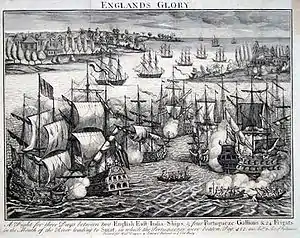

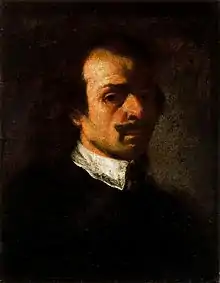
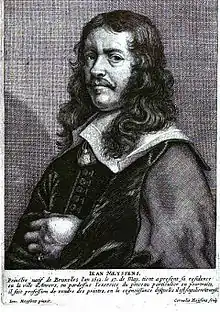
%252C_Florence.jpg.webp)
.jpg.webp)
